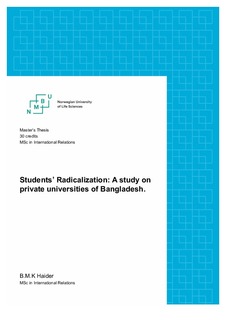| dc.description.abstract | Private universities in Bangladesh are composed with students from all portion of society. Students from rural areas as well as from city areas. But one unique feature that private universities contains that it offers its students job oriented degree and in doing so they create a situation where students found themselves at a crossroad between westernized lifestyle and traditional culture of the country. However, neither the problem of radicalization nor student radicalization is new in Bangladesh, the thing which is new is the students from westernized and job oriented education institutions are engaging with violent acts. This new phenomenon has challenged the traditional understanding that students from Madrasas (religious seminaries) for radicalization and terrorist acts. The characteristics of radicalization is not much different than other part of the world, in the sense that it has multiple causes that drives an individual towards radicalization. But the radicalization of students does differ in the context. Therefore, on the first stage we tried to look at the structural causes where students find themselves everyday. On this part, this paper has looked on the political causes, causes that can arise from institution where they belong and tried to find out how they see their future given the present political structure. Followed by the anti social causes how they perceive their economical situation and assessing their level of radical view, where this paper has asked questioned which is typically hold by extremist organization and individuals. The quantitative survey suggests that there is a complex mixture of political grievances strengthened not by socio-economic factors but by intolerance for different view. On the second stage this paper conducted qualitative survey to unearth the source of intolerance and why and how students get radicalized. The data finding showed that the students follows a pattern of bottom up approach which is fueled by political violence and intolerance in the national level coupled with source of grievances form outside the country and in the global situation. Modernization lead the families towards a crossroad between modernization and traditional structure, but most importantly the radicalization process is altogether fueled by rapid development in the interpersonal communication sector. | nb_NO |
